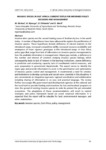Invasive species in east Africa: current status for informed policy decisions and management

View/
Date
2013Author
Gichua, M.
Njoroge, G.
Shitanda, D.
Ward, D.
Metadata
Show full item recordAbstract
Invasive alien species are the second leading cause of biodiversity loss in the world
today. A number of hypotheses have been advanced to explain the proliferation of
invasive species. These hypotheses include deficiency of natural enemies in the
introduced range, increased competitive ability, increased resource availability and
emergence of more vigorous genotypes in the introduced range. In East Africa
policy gaps that range from lack of information on invasive species management to
how the available information is managed exist. Major gaps include, a deficiency in
the number and interest of scientists studying invasion species biology, which
subsequently leads to lack of interest in the learning institutions, severe deficiency
in predictive and monitoring capacity, lack of coordinated control measures, and
poor preparation in government departments. This report serves to identify the
major gaps and provide information to assist in the prioritization and optimization
of invasive species control and management. It recommends a need for scholars
and institutions to develop curricula and recruit more scientists in this discipline. It
also recommends an integrative approach, regional coordination and collaboration
including sharing of information in an easy and practical language. The review
further encourages the government and development agencies at the national and
the local level to provide funding and incentives for low and localized programs to
slow the spread of existing invasive species in order to protect the yet uninvaded
ecosystems. The adaptation of these recommendations will result to control
strategies and policy framework based on sound empirical information It is
expected that the report will be valuable for land, environmental managers and
other stakeholders
